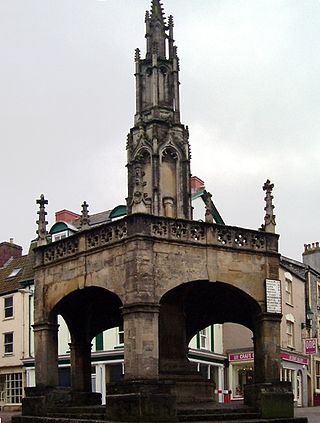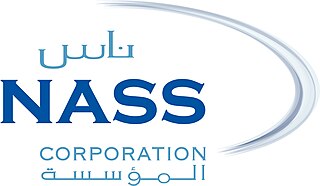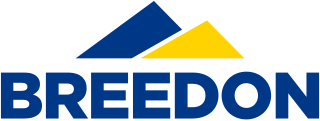
Concrete is a composite material composed of aggregate bonded together with a fluid cement that cures to a solid over time. Concrete is the second-most-used substance in the world after water, and is the most widely used building material. Its usage worldwide, ton for ton, is twice that of steel, wood, plastics, and aluminium combined.

A cement is a binder, a chemical substance used for construction that sets, hardens, and adheres to other materials to bind them together. Cement is seldom used on its own, but rather to bind sand and gravel (aggregate) together. Cement mixed with fine aggregate produces mortar for masonry, or with sand and gravel, produces concrete. Concrete is the most widely used material in existence and is behind only water as the planet's most-consumed resource.

Portland cement is the most common type of cement in general use around the world as a basic ingredient of concrete, mortar, stucco, and non-specialty grout. It was developed from other types of hydraulic lime in England in the early 19th century by Joseph Aspdin, and is usually made from limestone. It is a fine powder, produced by heating limestone and clay minerals in a kiln to form clinker, and then grinding the clinker with the addition of several percent gypsum. Several types of portland cement are available. The most common, historically called ordinary portland cement (OPC), is grey, but white portland cement is also available. Its name is derived from its resemblance to Portland stone which is quarried on the Isle of Portland in Dorset, England. It was named by Joseph Aspdin who obtained a patent for it in 1824. His son William Aspdin is regarded as the inventor of "modern" portland cement due to his developments in the 1840s.

CRH plc is an international group of diversified building materials businesses whose headquarters is in Dublin, Ireland. It manufactures and supplies a wide range of products for the construction industry. The group was formed through a 1970 merger of two leading Irish public companies, Cement Limited and Roadstone Limited (1949). CRH's primary listing is on the New York Stock Exchange since 2023, prior to which it was on the London Stock Exchange and on Euronext Dublin.

Vulcan Materials Company is an American company based in Birmingham, Alabama. It is principally engaged in the production, distribution and sale of construction materials. Vulcan is the largest producer of construction materials, primarily gravel, crushed stone, and sand, and employs approximately 12,000 people at over 400 facilities. Vulcan serves 22 states, the District of Columbia, Mexico, Canada, Bahamas and the U.S. Virgin Islands. Vulcan's innovative Crescent Market project led to construction of a large quarry and deep water seaport on the Yucatán Peninsula of Mexico, just south of Cancun. This quarry supplies Tampa, New Orleans, Houston, and Brownsville, Texas, as well as other Gulf coast seaports, with crushed limestone via large 62,000-ton self-discharging ships.

Construction aggregate, or simply aggregate, is a broad category of coarse- to medium-grained particulate material used in construction. Traditionally, it includes natural materials such as sand, gravel, crushed stone. As with other types of aggregates, it is a component of composite materials, particularly concrete and asphalt. Aggregates are the most mined materials in the world, being a significant part of 6 billion tons of concrete produced per year.
Tarmac Group Limited was a British building materials company headquartered in Wolverhampton, United Kingdom. It produced road surfacing and heavy building materials including aggregates, concrete, cement and lime, as well as operating as a road construction and maintenance subcontractor. The company was formerly listed on the London Stock Exchange and was once a constituent of the FTSE 100 Index.

Aggregate Industries, a member of the Holcim Group, is a company based in the United Kingdom with headquarters at Bardon Hill, Coalville, Leicestershire. Aggregate Industries manufactures and supplies a range of heavy building materials, primarily aggregates such as stone, asphalt and concrete to the construction industry and other business sectors. Aggregate Industries also manufactures and imports cement, and provides a range of aggregate-associated goods and services, these include the manufacture of masonry and reconstructed stone items for construction industry and domestic applications, the manufacture of pre-cast concrete items, the supply of ready-mixed concrete, design and project management consulting, and resurfacing contracting services.

Heidelberg Materials is a German multinational building materials company headquartered in Heidelberg, Germany. Formerly known as HeidelbergCement AG, the company has rebranded as Heidelberg Materials in September 2022. It is a DAX corporation and stands as one of the world's largest building materials companies. On 1 July 2016, HeidelbergCement AG completed the acquisition of a 45% shareholding in Italcementi. This acquisition made HeidelbergCement the number one producer of construction aggregates, the second-largest in cement and the third-largest in ready-mixed concrete worldwide. In the 2020 Forbes Global 2000, HeidelbergCement was ranked as the 678th -largest public company in the world.

Somerset is a county in the south west of England. It is a rural county and transport infrastructure has been significant in industrial development. There is some heavy industry particularly related to the defence technologies and the county has several centres for stone quarrying, although the coalfield is now closed.

Crushed stone or angular rock is a form of construction aggregate, typically produced by mining a suitable rock deposit and breaking the removed rock down to the desired size using crushers. It is distinct from naturally occurring gravel, which is produced by natural processes of weathering and erosion and typically has a more rounded shape.

A concrete plant, also known as a batch plant or batching plant or a concrete batching plant, is equipment that combines various ingredients to form concrete. Some of these inputs include water, air, admixtures, sand, aggregate, fly ash, silica fume, slag, and cement. A concrete plant can have a variety of parts and accessories, including: mixers, cement batchers, aggregate batchers, conveyors, radial stackers, aggregate bins, cement bins, heaters, chillers, cement silos, batch plant controls, and dust collectors.

Mining in the United Kingdom produces a wide variety of fossil fuels, metals, and industrial minerals due to its complex geology. In 2013, there were over 2,000 active mines, quarries, and offshore drilling sites on the continental land mass of the United Kingdom producing £34bn of minerals and employing 36,000 people.

Concrete is produced in a variety of compositions, finishes and performance characteristics to meet a wide range of needs.

Heidelberg Materials is a premixed concrete, aggregates and precast company. Founded in 1949 as Pioneer Concrete and later re-branded to Pioneer International, it was taken over by Hanson in 1999. In 2024 Hanson was renamed to the now current ‘’’Heidelberg Materials’’’. With more than 4,000 employees across 300 sites, we have an extensive production and logistics network across Australia.

Nass Corporation B.S.C. is a Bahraini public joint-stock company established and listed on the Bahrain Stock Exchange since the year 2005. The paid-up capital is currently BHD 22 million.
Tarmac is a British building materials company headquartered in Solihull, England. The company was formed as Lafarge Tarmac in March 2013, by the merger of Anglo American's Tarmac UK and Lafarge's operations in the United Kingdom. In July 2014, Anglo American agreed to sell its stake to Lafarge, to assist Lafarge in its merger with Holcim and allay competition concerns.
Akkord Industry Construction Investment Corporation OJSC is an Azerbaijani company that does construction work and produces construction materials. The company builds infrastructure projects in Georgia, Ukraine, Kazakhstan, Uzbekistan, and Turkey.

Breedon Group plc is a British construction materials company which has its headquarters at Breedon on the Hill, Leicestershire, England. It is listed on the London Stock Exchange and is a constituent of the FTSE 250 Index.

Oldcastle Materials Inc. is a supplier of asphalt, concrete, and other building materials, and also offers construction and paving services. The Atlanta-based company is a subsidiary of CRH plc, a publicly traded international group of diversified building materials businesses, and has approximately 18,000 employees at 1,200 locations, as of March 2018.


















